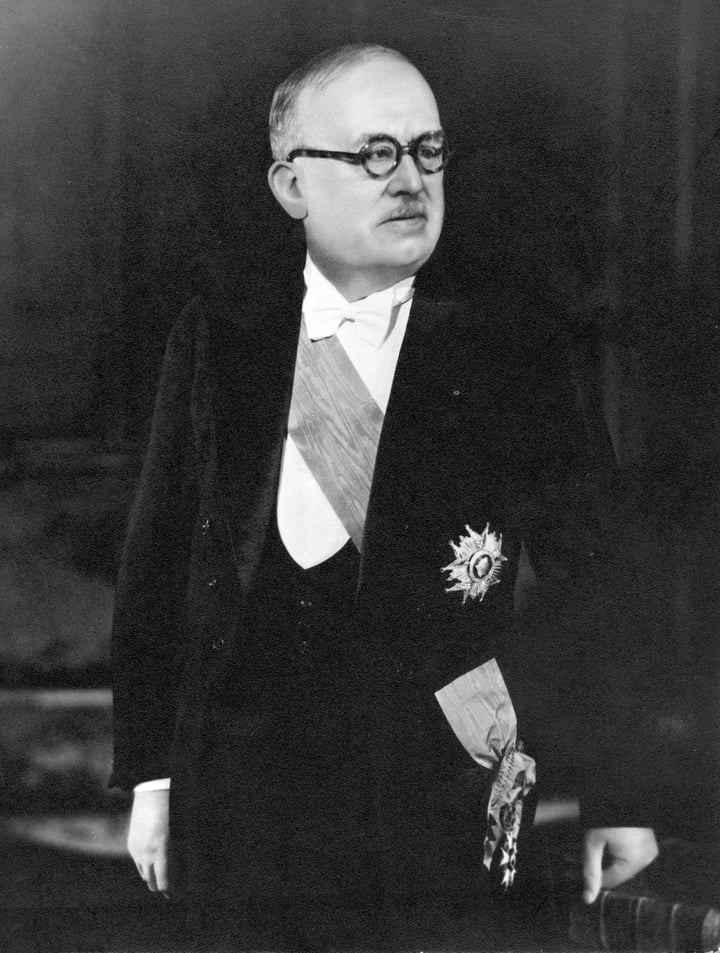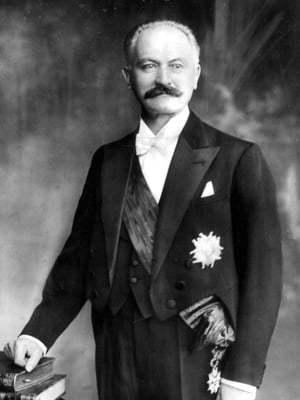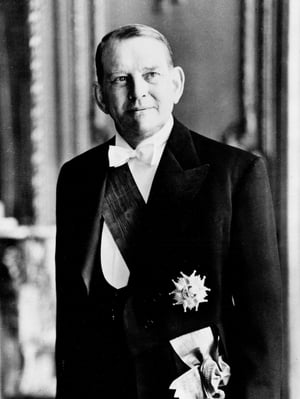
© La Documentation française. Photo Harcourt
27 August 1884
Jules Vincent Auriol was born in Revel (Department of Haute-Garonne).
1905
He was awarded a degree in Law and became a member of the Toulouse Bar.
1 June 1912
He married Michelle Aucouturier.
1914-1936
He was a Socialist Deputy from the Muret in the Department of Haute Garonne.
1925-1947
He served as Mayor of Muret.
1928-1947
He was Haute-Garonne Departmental Councillor, for the Carbonne district and held this office until he was elected President of the Republic.
10 May 1932
Albert Lebrun was elected President of the Republic.
4 June 1936-21 June 1937
Vincent Auriol served as Minister of Finance in the Government of the Front Populaire.
22 June 1937-14 January 1938
He served as Minister of Justice in the Government of the Front Populaire.
15 January-8 April 1938
He served as Minister for the Coordination of Ministerial Services at the Presidency of the Council in the Government of the Front Populaire.
10 July 1940
He was one of the 80 parliamentary members to vote against granting full powers to Marshal Pétain. He also refused to board the Massilia.
25 September 1940-13 March 1941
He was interned at Hôtel Notre-Dame de Pellevoisin, in the Department of Indre, then moved to Vals-les-Bains on 1 January 1941 and later to the Hôpital d’Aubenas on 9 March 1941.
Until October 1942, he lived under house arrest in Muret.
October 1941-11 April 1942
Worried at the time of the Riom Trial, he was tried before the civil court of Muret, which dismissed his case.
October 1942-October 1943
He lived clandestinely in the mountains of Aveyron and the Causses du Tarn where he wrote most of his book Hier-Demain. He participated actively in the French Resistance in southern France.
October 1943
He joined the French Resistance in London, then went to Algiers where he became a member of the Free French Consultative Assembly until 25 July 1944, and chaired the Foreign Affairs Committee.
He also worked on the Legislation and State Reform Committee.
1-22 July 1944
He represented France at the United Nations Monetary and Financial Conference (Bretton Woods Conference).
7 November 1944-3 August 1945
He was a member of the provisional Consultative Assembly of Paris.
21 October 1945
He was elected member of the first national Constituent Assembly.
21 November 1945-2 January 1946
He served as Ministre d’État in the de Gaulle Government.
January 1946
He led the French delegation at the first United Nations General Assembly and Security Council in London.
3-23 January 1946
He acted as the Head of the Provisional Government of the French Republic following the departure of General de Gaulle until the investiture of Félix Gouin.
31 January-19 April 1946
He served as President of the first Constituent Assembly.
A first draft constitution was drafted.
2 June 1946
He served as President of the second Constituent Assembly.
27 October 1946
The Constitution of the Fourth Republic was adopted.
10 November 1946
He served as a Deputy in the National Assembly.
3 December 1946
He was elected President of the Assembly, he provisionally exercised powers of Head of State.
16 January 1947
He was elected President of the Republic and French Union, in the first round of voting, by Parliament in a joint session at Versailles. He was 62 years of age. He began to keep a journal about his seven-year term when he entered office.
1947
He visited Oradour-sur-Glane.
29 May-5 June 1949
He visited Algeria.
6 January 1949
He extended his new year wishes to the French people.
7-10 March 1950
He visited the United Kingdom.
1951
India’s Prime Minister Nehru visited France.
20 March-8 April 1951
He visited the United States and Canada.
23 December 1953
His successor, President René Coty, was elected.
1954-1958
He was active as a journalist, notably in France-Soir, where he publishes articles of a political nature.
1 December 1954
He became the President of Honour of the World Veterans Federation (WVF)
31 March-4 April 1955
He chaired the United Nations Conference of Nongovernmental Organizations Interested in the Eradication of Prejudice and Discrimination, which met in Geneva.
20 April-5 May 1958
He visited Israel for the tenth anniversary of the Hebrew State.
2 October 1958
He publically advocated the “no” vote in the referendum on the Constitution.
15 December 1958
He resigned from the SFIO.
1960
He stepped down from the Constitutional Council of which he was an ex officio member pursuant to the Constitution of the Fifth Republic, to protest the limited interpretation of powers of the Council and the Parliament that General de Gaulle had.
1965
He set up the Journal du Septennat, published after his death.
1 January 1966
Vincent Auriol died in Paris.
also available
Presidents' biographiesUpdated : 15 December 2022

